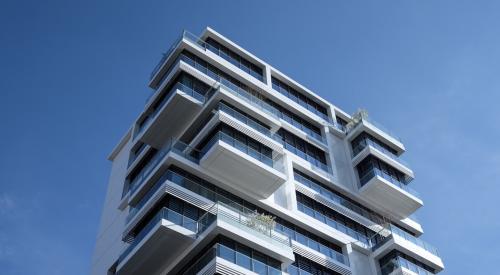|
Heather McCune's Editorial Archives
|
Although the pace of growth and traffic congestion in their communities concern Americans, they prefer accommodating growth by expanding and improving infrastructure such as roads and schools rather than limiting it through regulation. Such are the findings of the recent 1999 Metro-politan Area Growth Issues Survey by the National Association of Home Builders (NAHB).
|
Considering new homes and other forms of housing being built, do you think that your area is growing?
|
|||||
|
Area
|
|||||
| San Diego % | Minn-St. Paul % | Atlanta % | Washington % | Denver % | |
| Too Fast | 45.4 | 28.9 | 58.2 | 49.8 | 59.2 |
| Right Pace | 44.0 | 61.5 | 34.1 | 40.4 | 34.0 |
| Too Slow | 6.0 | 5.9 | 4.7 | 5.5 | 2.4 |
| Unsure | 4.6 | 3.8 | 3.0 | 4.3 | 4.4 |
"We are very encouraged by the results of this survey. We conducted it in high-growth metro-politan areas where we knew growth issues would be a concern," said NAHB Vice Presi-dent/Secretary Gary Garczynski, a home builder from Newington, Va. "Americans recognize the need for new homes to accommodate the nation's rapidly growing population, and they prefer smart, practical approaches to dealing with growth."
The telephone survey of 500 registered voters in each of five major metropolitan areas also found strong support for broad-based funding of infrastructure to ease congestion and accommodate future growth. Further, it reveals that most people do not attribute traffic congestion to growth. In-stead, they believe a combination of poor government planning and people driving more for per-sonal reasons is to blame.
Significantly, the results were consistent across four of the five metropolitan areas surveyed: Denver, Atlanta, San Diego and Washington, D.C. Results varied somewhat in Minneapolis-St. Paul, where residents tended to be less concerned over growth-related issues.
"Many people are concerned about growth, but as yet there is no broad consensus on how to handle it or even on its effects," Garczynski added. "These survey results bring clarity to the issue and help define public preferences and expectations," he said.
Pace of Growth
Commenting on the specifics of the survey, Garczynski notes that in order to get an accurate reading of how people view growth and its effects, NAHB selected markets that have experienced sustained, above average growth during the current economic expansion, now in its ninth year.
Residents in three of the five markets were concerned with the pace of residential growth; 59.2% in Denver, 58.2% in Atlanta and 49.8% in Washington indicate that their area is growing too fast. Opinion was split in San Diego, where 45.4% say the pace of residential growth is too fast and 44.0% say growth is occurring at the right pace. In Minneapolis-St. Paul, the majority, 61.5%, re-port housing growth is occurring at the right pace.
Interestingly, given the relationship between business growth and the need for new housing, the majority of respondents in every market -- except Atlanta -- feel that business growth is occurring at the right pace. More than 59% in Minneapolis-St. Paul, 50.3% in Denver, 49.6% in Washington and 58.8% in San Diego say that new businesses are being built at the right pace. In Atlanta, opinion splits, with 39.3% saying business development is too fast and the same percentage indicating that business growth is occurring at the right pace.
Growth and Housing Choice
Although concerned with the rate of growth, those surveyed prefer that government policy be designed to accommodate growth by ensuring that critical services and improvements are available rather than directing where growth occurs through regulations. More than 61% in Atlanta, 58.9% in Minneapolis-St. Paul, 57.8% in San Diego, 56.1% in Washington and 52.1% in Denver say its up to government to ensure sure that roads, schools and other services are available where people want to live.
Likewise, when asked to choose between two options for revitalizing downtowns and older sub-urbs, poll participants prefer encouraging people to live in existing neighborhoods closer to work and public transportation rather than limiting growth in an effort to force growth into already-developed areas. At least 70% of those surveyed in San Diego, Minneapolis-St. Paul and Washing-ton believe government should invest resources in older existing neighborhoods to encourage peo-ple to live there. In Atlanta and Denver, 65.9% and 64.0% concur, respectively.
Improving Funding for Roads and Schools
The survey also shows that people believe strongly that funding for infrastructure improvements should be broad-based, with the cost spread throughout the entire community rather than borne by a single segment of the population. Generally, the survey respondents suggest government does not spend enough on schools and roads.
Almost 73% in Minneapolis-St. Paul, 69.8% in Washington, 64.7% in Atlanta, 64.2% in San Di-ego and 64% in Denver say that everyone should pay for new schools rather than selectively im-posing impact fees.
The majority of those surveyed in every metropolitan area except Minneapolis-St. Paul suggest that the federal and state governments spend too little to renovate and expand schools and construct new ones. In San Diego, 58.2% say state and federal governments don't spend enough, and in At-lanta, 46.9% indicate the same. In Washington, school spending levels are too low for 47.6%, and in Denver virtually the same percentage concur. In Minneapolis-St. Paul, 43.7% say that the state and federal government spend about the right amount, and 10.9% indicate they spend too much.
Local government spending is viewed somewhat more favorably by those who were polled. Al-most 45% in Denver say that local government does not spend enough on schools and 35.6% feel it spends about the right amount. In Washington, 44.3% say local government does not spend enough, while 38.6% take the opposite view. Opinion split almost equally split in Atlanta, with 41.4% indi-cating that local government does not spend enough on schools and 42.8% saying it spends about the right amount. In Minneapolis, more than half say local government spends about the right amount on schools and 29.8% say that it doesn't spend enough. Only in San Diego, with 53.8%, does the majority think that local government does not spend enough on schools; 31.2% in San Di-ego say spending on schools is about right.
Opinions were similar for traffic improvements and spending. The majority in each market sup-port broad-based funding of transportation system improvements. Government does not spend enough on building new roads and improving existing ones according to the majority in three of the five markets. Forty-five percent of voters in San Diego say that government does not spend enough, while 35.8% favor current spending levels. In Atlanta, 42.8% indicate that government spending is inadequate and 38.7% say it is about right. In the Washington area, 46.7% say that government road spending is inadequate, and 33.3% say it's about the right amount. Less than a third of the poll participants in Minneapolis, 31.4%, say government doesn't spend enough on roads. Almost half favor current spending levels.
To improve traffic conditions, the majority in every market say that most or all money should be spent on road improvements or that funds should be split evenly between road improvements and public transportation. Fewer than 25% in each market agree that all or most money should be spent on public transportation. In Atlanta, 69.8% want most or all money spent on roads or that spending should be split evenly. In Minneapolis-St. Paul, 72.7% concur, and in Denver, 72.8% indicate the same preferences. In Washington, 70.8% prefer splitting the money evenly or spending most or all on roads.
Traffic-Related Issues
Although concerned about traffic, those surveyed overwhelmingly prefer improving existing roads and building new ones to limiting development to areas close to public transportation as a way to control sprawl.
The majority in four of the five markets indicate that traffic congestion is a major concern, with 48.2% in San Diego, 53.5% in Atlanta, 55.5% in Washington and 58.6% in Denver characterizing it as a "very big problem." Residents of Minneapolis-St. Paul have fewer concerns about traffic con-gestion, with 28.7% rating it as a "very big problem" and 39.3% indicating that it is "somewhat of a problem."
In every market except Minneapolis-St. Paul, the majority say that daily driving negatively ef-fects their quality of life. Almost 51% in San Diego, 49.9% in Atlanta, 51.2% in Washington and 56.8% in Denver indicate that driving in their market is very difficult and has a very negative effect on their quality of life. In Minneapolis-St. Paul, 38.3% say driving has a negative impact, 39.3% say it has no impact, and 18.4% say it has a positive impact.
Though concerned about growth, most survey respondents do not blame it for traffic congestion. Instead, the majority attribute traffic congestion to poor government planning and people driving more for personal reasons. In San Diego, 37.4% attribute traffic congestion to growth while 53% blame poor planning and more driving for personal reasons. In Minneapolis-St. Paul, 36.0% say traffic problems stem from growth and 53.9% suggest it is due to poor planning and more personal driving. In Washington, the percentages are 30.4% and 57.4%, while in Atlanta the breakdown is 38.7% and 50.7%. Only in Denver is traffic congestion attributed primarily to growth, with 50.7% citing more cars from new growth as the cause.
To solve traffic problems, residents in every metropolitan area overwhelmingly prefer improving roads to requiring that new homes be constructed near public transportation. Almost 67% in Minneapolis-St. Paul, 62.0% in Denver, 58.8% in San Diego, 57.3% in Washington and 53.5% in At-lanta say improving and expanding roads is preferable to requiring that all new housing be built near existing roads and public transportation centers.
Metropolitan Area Growth Issues Survey
Interview Dates: November 29 to December 6
Sample Size: 500 in Each Market
Sample Frame: MSA
Eligibility: Registered Voters
Interview Method: Telephone
Margin of Error: +/- 4.3%
Heather McCune is the Editor-in-Chief for Professional Builder and Luxury Home Builder. Please email her with any comments or questions regarding her column.











